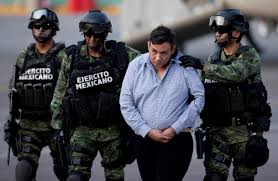A Kenyan national, Elisha Odhiambo Asumo, has been charged in the United States over allegations that he conspired to supply military-grade weapons to one of Mexico’s most feared criminal organizations — the Cartel de Jalisco Nueva Generación (CJNG). The indictment, unsealed in the Eastern District of Virginia, paints a picture of an international arms trafficking network stretching from Africa to Europe and into the heart of Mexico’s drug wars.
According to U.S. prosecutors, Asumo worked with Bulgarian arms trafficker Peter Dimitrov Mirchev, Ugandan national Michael Katungi Mpeirwe, and Tanzanian national Subiro Osmund Mwapinga. The group allegedly forged export documents to disguise deadly shipments that included AK-47 rifles, rocket launchers, and even anti-aircraft systems. The CJNG, officially designated by the U.S. as a foreign terrorist organization, is notorious for extreme violence and advanced firepower, which it uses to protect large-scale cocaine shipments into the United States.
Court documents allege that Mirchev coordinated meetings with undercover agents posing as cartel members. He is accused of recruiting Asumo to fraudulently obtain an End-User Certificate (EUC) from Tanzania, a document meant to confirm the legal recipient of imported weapons. The certificate falsely identified another country as the buyer, hiding the fact that the arms were bound for the Mexican cartel.
Prosecutors say Asumo then brought in Mpeirwe, who in turn recruited Mwapinga, to help secure the forged Tanzanian EUC authorizing the import of AK-47 rifles. With the fake paperwork in place, the conspirators allegedly shipped a test consignment of 50 AK-47s, complete with magazines and ammunition, from Bulgaria. Investigators say these were intended for CJNG operatives.
The indictment also claims the group planned to sell the cartel far more dangerous weaponry — including surface-to-air missiles, anti-aircraft drones, and ZU-23 anti-aircraft systems. Mirchev reportedly compiled a weapons list worth about US$58 million. The accused men allegedly agreed to keep producing fake arms control documents to ensure CJNG’s role remained hidden.
The U.S. Attorney’s Office has warned that if convicted, each defendant faces a mandatory minimum sentence of 10 years in prison and could be jailed for life. However, actual sentences for federal crimes are usually less than the maximum possible term.
Law enforcement agencies have already moved in. Mirchev was arrested in Madrid, Spain, and is awaiting extradition to the U.S. Asumo was picked up in Casablanca, Morocco, and is currently going through extradition proceedings. Mwapinga was arrested in Accra, Ghana, and extradited to the U.S. in July 2025. Mpeirwe remains on the run.
The case also draws attention to Kenya’s growing role in the global drug and arms trade. In 2024, Kenyan authorities dismantled a methamphetamine lab near Namanga on the Kenya-Tanzania border — the first confirmed large-scale manufacturing site in East Africa linked to CJNG. Around the same time, a suspected cartel operative was arrested while trying to flee the country, highlighting deeper cartel penetration into the region.
Kenya has in recent years become both a producer and a transit hub for methamphetamine. Experts warn of a rising threat from synthetic opioids, while cocaine trafficking — largely controlled by Mexican cartels — increasingly exploits Kenya’s ports and coastal routes. Corruption and weak enforcement make the country an attractive base for transnational organized crime.
Neighboring Tanzania has also seen large seizures of methamphetamine and precursor chemicals, pointing to a wider regional threat. Analysts say cartel activities in East Africa are often protected by political interference and bribery, making them hard to dismantle.
The United States, through agencies such as the Drug Enforcement Administration (DEA) and the Department of Justice (DOJ), is partnering with Kenyan security agencies to counter the menace. This includes training officers, providing investigative tools, and improving intelligence sharing. But officials acknowledge that the sophistication, reach, and financial muscle of CJNG make it a serious challenge — one that requires cooperation across borders.
